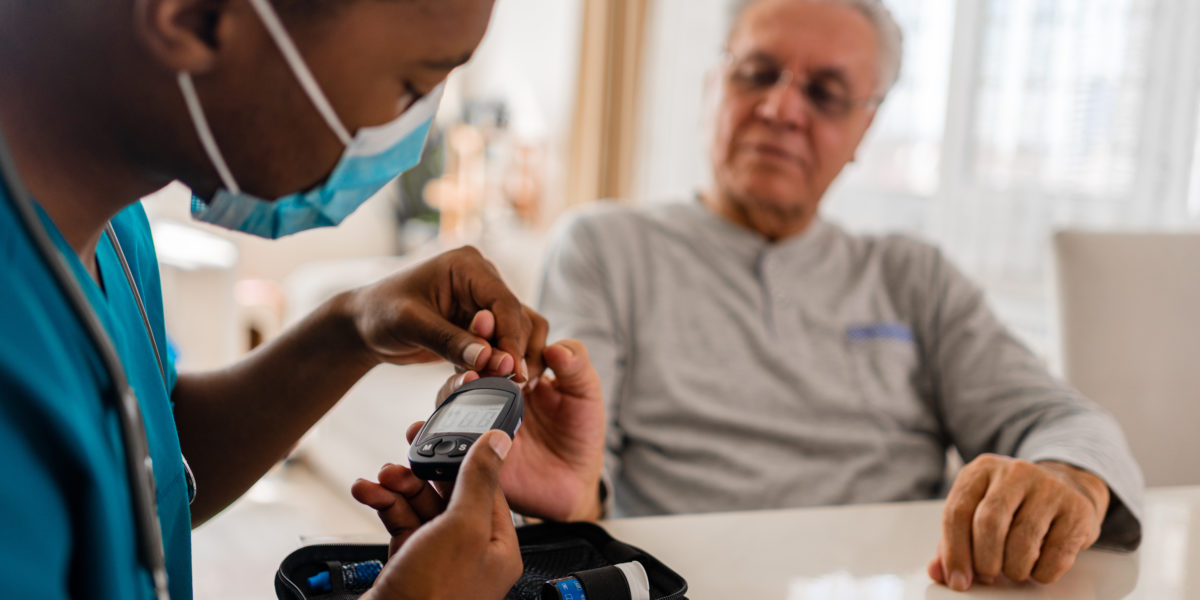Medicaid and the Children’s Health Insurance Program (CHIP) have served as critical supports to children, pregnant women, parents, seniors, and individuals with disabilities – covering 80 million individuals during the COVID-19 pandemic. Since February 2020, Medicaid enrollment has grown sharply to cover an additional 9.9 million individuals (a 13.9 percent increase).
As we start a new year, the financial and emotional hardships of the pandemic remain with us. Medicaid and CHIP continue to play a significant role in helping our country rebuild toward a healthier future. With federal waivers and flexibilities associated with Medicaid in mind, there are three key trends we’ll be watching evolve in 2022:
Increasing access to telehealth
At the onset of the pandemic, the Centers for Medicare and Medicaid Services (CMS) issued waivers to make it easier for beneficiaries to receive medical care through telehealth, covering both video and audio-only visits. As a result, all fifty states and D.C. expanded telehealth access for Medicaid beneficiaries, allowing greater flexibility in providing care to people in their homes, in rural areas, across state lines, and in connecting with established and new patients. Many states are continuing to utilize telehealth to serve its Medicaid population, recognizing that the modality significantly increased access to care for this vulnerable population.
In 2022, we envision a broader conversation emerging that details the benefits and drawbacks of telehealth for the Medicaid population, including a focus on how it can increase access to mental health services in schools, along with a focus on state authorities allowing medical services to be provided across state lines.
Kaiser Permanente prides itself on being a leader in virtual care, and the usage of telehealth services among our Medicaid population increased significantly during the pandemic. Across our Medicaid managed care footprint, the combined usage of telephone and video visits increased 233 percent since the beginning of the pandemic. As of November 2021, the Medicaid managed care population we serve nationally had over 4 million video and phone visits since the beginning of the pandemic, an average of 200,000 per month, compared to approximately 60,000 per month prior to the pandemic.
Increasing access to mental health and substance use disorder services for people dually eligible for Medicare and Medicaid
Given that the nation is facing a growing mental health crisis, CMS permanently expanded coverage for treating mental health and substance use issues, including endorsing audio-only or telephone visits for fee-for-service Medicare. This move will support greater access to care for people dually eligible for Medicare and Medicaid.
In addition to the service level expansion, as part of the 2022 Medicare Physician Fee Schedule, the agency allows federally qualified health centers (FQHC) and rural health clinics to provide beneficiaries mental health and substance abuse care in their homes and virtually. This rule expands opportunities for care at a critical time when the pandemic and the resulting economic recession have negatively affected many people’s mental health.
Community-funded clinics, rural health clinics, free clinics, school-based health centers, and FQHC are vital parts of our health care safety net. We work closely with community clinics through trainings and technical assistance. Regions may use peer-to-peer learning to expand the use of trauma-informed approaches in primary care settings. Kaiser Permanente views safety net clinics as essential community partners in our shared goal of improving the health of individuals and communities.
Maximizing eligibility redeterminations in 2022 and beyond
To prevent disruption of healthcare coverage during the pandemic, the 2020 Families First Coronavirus Response Act (FFCRA) requires states to keep people enrolled in their Medicaid programs as a condition of receiving enhanced federal matching funds through the end of the public health emergency (projected to last until January 16, 2022). After that point, states will have the ability to take up to 12 months to review each person’s eligibility for Medicaid.
Nationwide, it is expected that states will need to redetermine the eligibility of over 80 million people enrolled in Medicaid—nearly a quarter of the U.S. population. In 2022, we expect managed care organizations (MCOs) that provide for the delivery of Medicaid benefits and services to be engaged in the redetermination process since it will be complex and resource intensive. With guidance from CMS, MCOs can work with states to leverage their capabilities to improve the customer experience, reduce the number of people losing coverage, and support transitions to other forms of coverage for those no longer eligible for Medicaid. Below are several promising strategies MCOs and providers can support to keep people covered:
- Join CMS in supporting a national awareness campaign that creates greater public understanding and beneficiary participation in the Medicaid redetermination process occurring across states.
- Encourage states to conduct direct outreach to enrollees whose eligibility cannot be verified through data matches alone and from whom more information is needed. This would support continuous coverage for some of the most vulnerable people receiving Medicaid benefits.
- Support an individual’s transition to other forms of health coverage if they are ineligible for Medicaid. For example, states can use data to transition former Medicaid members to plans that participate in state-based marketplace coverage when appropriate.
Kaiser Permanente is committed to fully engaging in the redetermination process, while embedding equitable practices and maximizing ways to keep people covered in 2022 and beyond.
Our participation in Medicaid is core to Kaiser Permanente’s mission to provide high-quality, affordable health care services and to improve the health of our members and the communities we serve. To learn more, check out our recently published fact sheets that provide details on our participation and performance in Medicaid programs across our regions.
Millions of people rely on this critical program to receive important and timely whole-person care , especially during the pandemic. As we embark on the year ahead, let’s reaffirm our commitment to providing quality, affordable, and comprehensive health care coverage for our country’s most vulnerable citizens.


